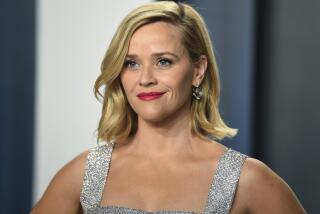A heartwarming soul is the truth behind ‘The Good Lie’

Betsy Sharkey reviews ‘The Good Lie’ Starring: Reese Witherspoon, Arnold Oceng, Corey Stoll, Sarah Baker, Ger Duany, and Emmanuel Jal. Video by Jason H. Neubert.
- Share via
Small deceptions for the greater good are at the heart of “The Good Lie” about a handful of Sudanese “lost boys” who were resettled in the U.S. The most obvious deception is the notion that Reese Witherspoon is the star.
The Oscar-winning actress is a minor player on-screen, a major player off when it comes to attracting audiences that might not otherwise come in the door.
Arnold Oceng, Ger Duany and Emmanuel Jal are the film’s real anchors, all with their own very real survivor stories that most certainly help inform this fictional piece — Duany and Jal were among the child soldiers forced to fight in Sudan; Oceng’s father was killed in the war.
But rather than the horrors of that war, “The Good Lie” is a triumph-over-tragedy saga that focuses far more on hope.
Credit director Philippe Falardeau for his determination to keep the Sudanese influence embedded throughout Margaret Nagle’s script, which was inspired by news reports, books and her own interviews with refugees.
Falardeau, the writer-director of the Oscar-nominated foreign language film of a few years ago “Monsieur Lazhar,” a very different sort of immigrant story, went to great lengths to fill the cast with Sudanese. In that he has done well. There is an old-fashioned charm in the film’s straightforward simplicity.
The story opens in Kenya’s Kakuma refugee camp in the 1990s as four Sudanese get ready to board a plane for the U.S. as part of a humanitarian initiative that resettled 3,600 in the United States. They came to be called “the lost boys.”
The film’s tight-knit group is led by Mamere (Oceng as the adult). He is the de facto chief after a series of losses, including his older brother Theo (Femi Oguns), who was taken by soldiers. Abital is his sister (Kuoth Wiel playing the older girl). Paul (Jal) and Jeremiah (Duany) are brothers in heart, Paul a boy from their village, Jeremiah met along the way.
As Carrie, the employment agent trying to find jobs for three of the refugees in Kansas City, Witherspoon dials it down nicely in the film and in the story just enough to make a difference.
The film shifts quickly back to the beginnings, when the refugees were children. Young Theo (Okwar Jale), Mamere (Peterdeng Mongok), Abital (Keji Jale), Paul (Deng Ajuet) and a few others are in the fields watching the cattle when troops storm their village, killing everyone else. The children follow the teaching of their elders and head for the refugee camps on foot, first Ethiopia, then Kenya.
Though the journey is marked by hardship and death, the film steps lightly around scenes of the civil war’s notorious, horrific brutality. Director of photography Ronald Plante, using a hand-held camera, keeps the action moving through the most difficult scenes, as if a glance is enough for us to get the point.
It’s a dicey decision. Even the most gripping war scene, which essentially involves a river of death, slips by quickly. Too quickly to have the kind of emotional traction that would have added more heft. The director uses that same restraint to hit the hopeful to better effect, keeping the film humanistic in uplifting ways without ever drifting into cheap sentimentality.
There is a nod to the decade the refugees spend growing up in the camp at Kakuma, Jeremiah already sensing his calling to be a preacher, Mamere’s to be a doctor. Once they land in Kansas City, the film begins to expose its real heart. Carrie lends a hand, as does her boss, Jack (Corey Stoll), and Christian aid worker Pamela (Sarah Baker), but the filmmakers have done a good job of constructing things so that the refugees’ story never slips into second place.
Oceng is particularly affecting as their torn leader. The actor, whose Ugandan mother ultimately settled them in Britain, has been working on stage and screen since he was a child. Considered one of Britain’s rising talents, his emotional turn in “The Good Lie” should serve as a good introduction here.
Duany, an international model who made his acting debut in “I Heart Huckabees,” gives the film its conscience. His Jeremiah is unashamed in his faith. Jal’s character provides Mamere’s main opposition. He is a successful hip-hop artist now living in Canada; two of his tracks are featured in the film. But as Paul, dreadlocks flying, his dance of joy is something to behold.
A paperwork issue sends Abital to a family in Boston, and efforts by “the boys” to have her join them in Kansas City is one of the subplots; it also is where Carrie begins to become more enmeshed in their lives.
But assimilation becomes the film’s central axis. As so often happens, the clash of cultures says as much about life here as there. As they gain insight into our world — employers want to see you smile, whether you mean it or not — Carrie and Jack change as well. The cultural differences test relationships, sometimes patience, there are moments of humor, moments of regret.
The pieces don’t always fit together as neatly as you might wish, but if you let it, “The Good Lie’s” heartwarming soul will win you over.
Twitter: @BetseySharkey
--------------------------------
‘The Good Lie’
MPAA rating: PG-13 ‘for thematic elements, some violence, brief strong language and drug use
Running time: 1 hour, 52 minutes
Playing: In general release
More to Read
Only good movies
Get the Indie Focus newsletter, Mark Olsen's weekly guide to the world of cinema.
You may occasionally receive promotional content from the Los Angeles Times.











